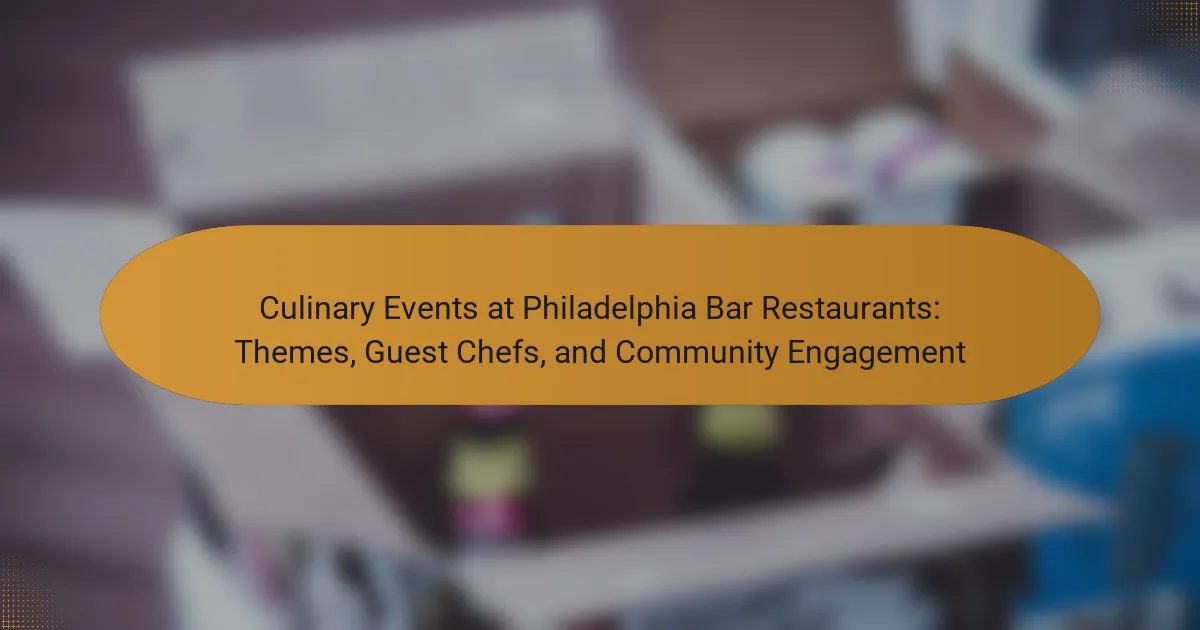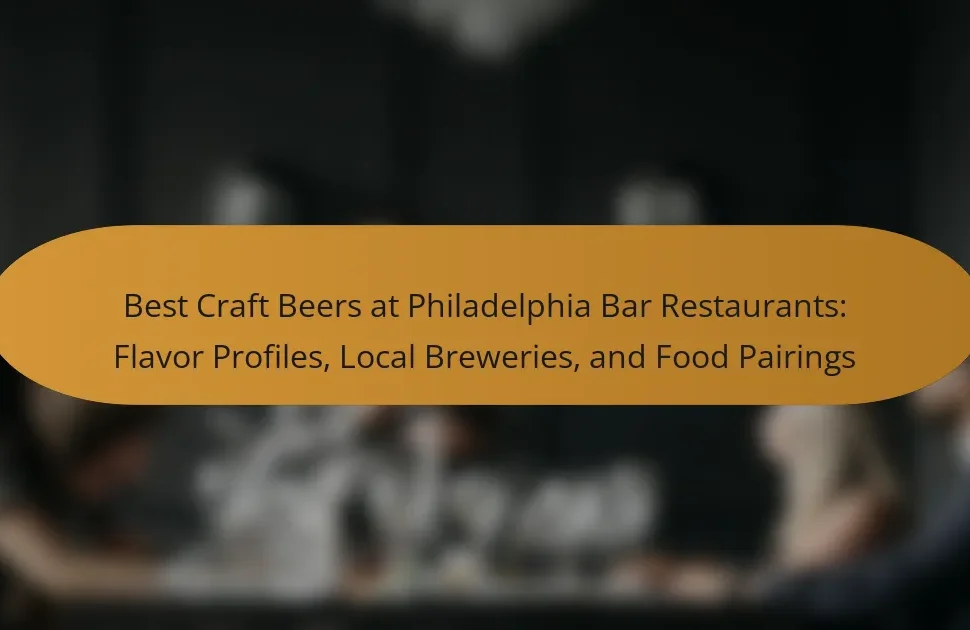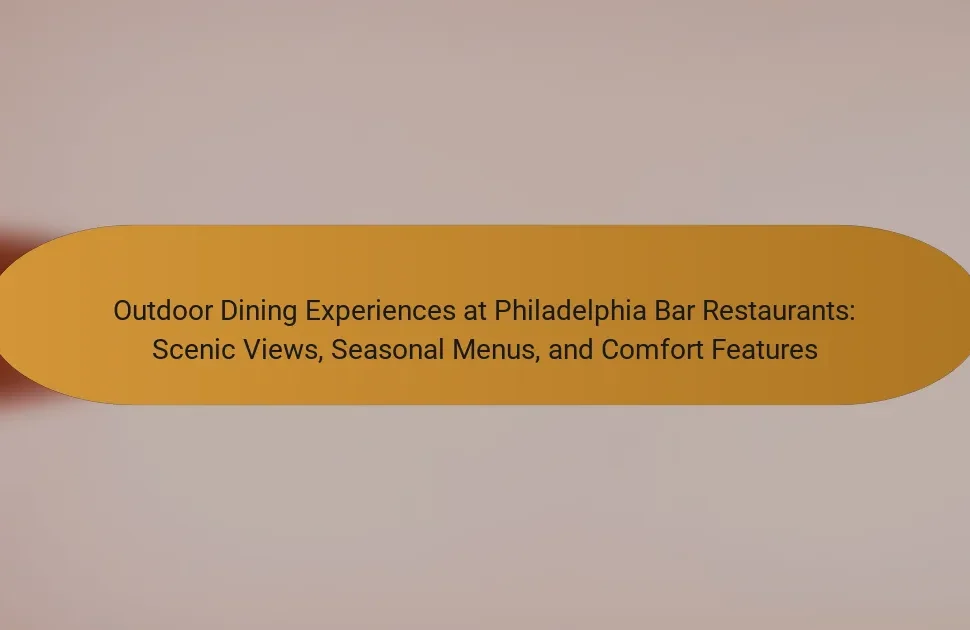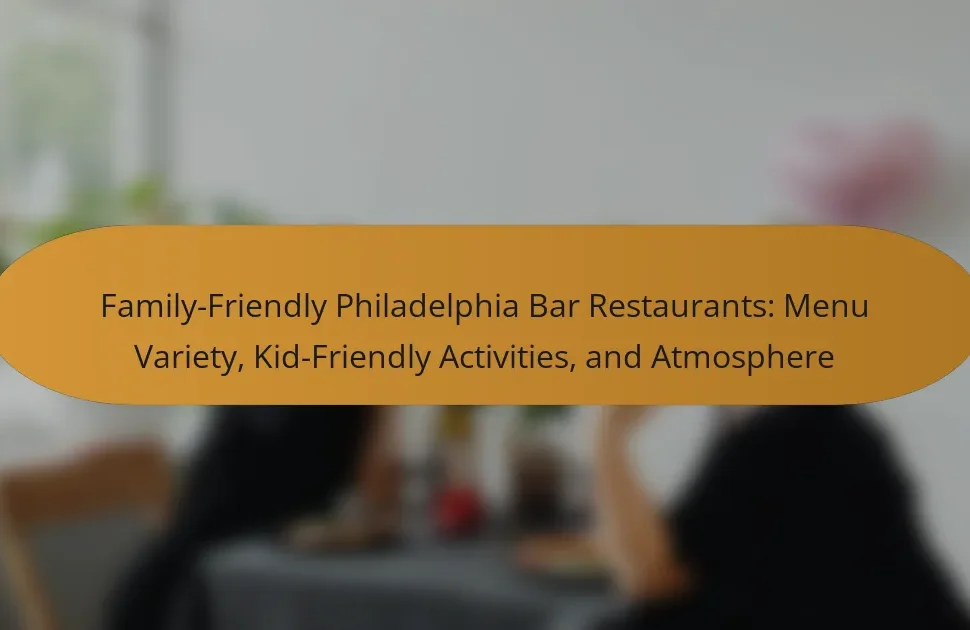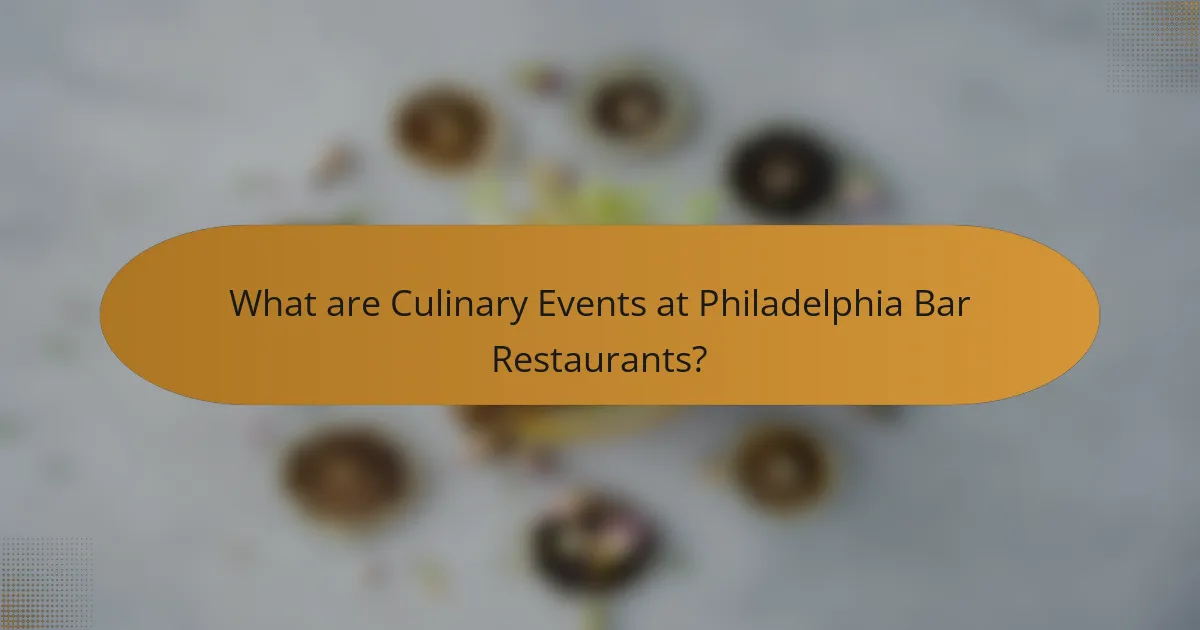
What are Culinary Events at Philadelphia Bar Restaurants?
Culinary events at Philadelphia bar restaurants are organized gatherings that showcase food and beverage experiences. These events often feature themes, such as seasonal ingredients or cultural cuisines. Guest chefs may be invited to create unique menus or host cooking demonstrations. Community engagement plays a significant role in these events, fostering local connections. Many bar restaurants also offer tastings, pairings, and workshops. These culinary events enhance the dining experience and promote culinary exploration. They contribute to Philadelphia’s vibrant food scene, attracting both locals and visitors.
How do these events enhance the dining experience?
Culinary events enhance the dining experience by creating unique atmospheres and engaging patrons. These events often feature guest chefs, which introduces diverse culinary styles and innovative dishes. For example, special theme nights can incorporate regional cuisines, encouraging exploration of new flavors. Interactive elements, such as cooking demonstrations, foster a deeper connection between chefs and diners. Community engagement through these events builds a sense of belonging among patrons. Studies show that unique dining experiences can increase customer satisfaction and loyalty. Overall, culinary events transform ordinary meals into memorable experiences.
What unique attributes define these culinary events?
Unique attributes of culinary events at Philadelphia bar restaurants include themed menus, guest chef collaborations, and community engagement initiatives. Themed menus often reflect seasonal ingredients or cultural cuisines. Guest chefs bring distinct culinary styles and expertise, enhancing the dining experience. Community engagement initiatives may involve local farms or charities, fostering connections. These events often feature interactive elements, such as cooking demonstrations or tastings. They also provide opportunities for networking among food enthusiasts. These attributes contribute to a vibrant culinary scene in Philadelphia’s bar restaurants.
How do themes influence the overall atmosphere of the events?
Themes significantly shape the overall atmosphere of culinary events. They create a cohesive experience that aligns the decor, menu, and activities. For instance, a “Farm-to-Table” theme emphasizes fresh, local ingredients, enhancing the dining experience. This theme often includes rustic decor and educational components about sourcing food. A “Cultural Cuisine” theme immerses guests in specific culinary traditions, influencing music and presentation styles. Research shows that thematic elements can increase guest engagement and satisfaction, as they feel a part of a unique experience. According to a study in the Journal of Hospitality & Tourism Research, themed events can boost attendance by up to 30%.
What role do guest chefs play in these events?
Guest chefs enhance culinary events by bringing unique flavors and techniques. They introduce diverse cuisines that attract a broader audience. Their participation often creates a buzz around the event, increasing attendance. Guest chefs may collaborate with local chefs, fostering community connections. They often showcase signature dishes, elevating the dining experience. This collaboration can lead to innovative menu items exclusive to the event. Additionally, guest chefs often share their culinary expertise through demonstrations. This educational aspect engages attendees and promotes culinary appreciation.
How are guest chefs selected for culinary events?
Guest chefs for culinary events are selected based on their expertise and reputation. Event organizers often seek chefs with a strong culinary background. They may consider chefs who have received awards or recognition in the industry. Recommendations from culinary peers can also play a significant role. Additionally, the theme of the event may influence the selection process. Organizers look for chefs whose style aligns with the event’s concept. This ensures a cohesive dining experience for attendees. Collaboration with local culinary schools can introduce emerging talent. Ultimately, the goal is to enhance the event’s appeal and quality.
What impact do guest chefs have on local cuisine?
Guest chefs significantly influence local cuisine by introducing new flavors and techniques. They often bring unique culinary traditions from their regions. This infusion of diverse cooking styles can lead to innovation in local dishes. Guest chefs also collaborate with local chefs, fostering knowledge exchange. Their presence can attract diners and boost restaurant visibility. Events featuring guest chefs often create excitement in the community. This can lead to increased patronage and economic benefits for local establishments. Additionally, guest chefs may highlight local ingredients, promoting regional produce and suppliers.
How do culinary events promote community engagement?
Culinary events promote community engagement by bringing people together around shared food experiences. These events foster a sense of belonging and connection among attendees. They often feature local chefs, highlighting regional cuisine and culture. This encourages participants to support local businesses and artisans. Engaging activities like cooking demonstrations and tastings enhance interaction. Community members learn new skills and recipes, fostering collaboration. According to a study by the National Restaurant Association, 74% of consumers enjoy dining experiences that connect them with their community. Such statistics underscore the importance of culinary events in strengthening community ties.
What are the benefits of community involvement in these events?
Community involvement in culinary events enhances social cohesion and fosters local pride. Engaging residents promotes a sense of belonging and strengthens community ties. It also encourages local economic growth by supporting nearby businesses. According to a study by the National Endowment for the Arts, community events can increase local spending by up to 30%. Furthermore, collaboration among community members can lead to innovative culinary experiences. This involvement often results in diverse participation, showcasing a variety of cultural cuisines. Overall, community engagement in these events enriches the culinary landscape of Philadelphia.
How do these events foster connections among local businesses?
Culinary events foster connections among local businesses by creating networking opportunities. These events bring together restaurant owners, chefs, and suppliers in a shared space. Participants can exchange ideas and collaborate on future projects. Local businesses gain visibility through joint marketing efforts during these events. For example, restaurants may feature ingredients from local farms and promote them collectively. This collaboration enhances community support, driving customer traffic to multiple establishments. According to a study by the Philadelphia Chamber of Commerce, 75% of local businesses reported increased partnerships after participating in community events.
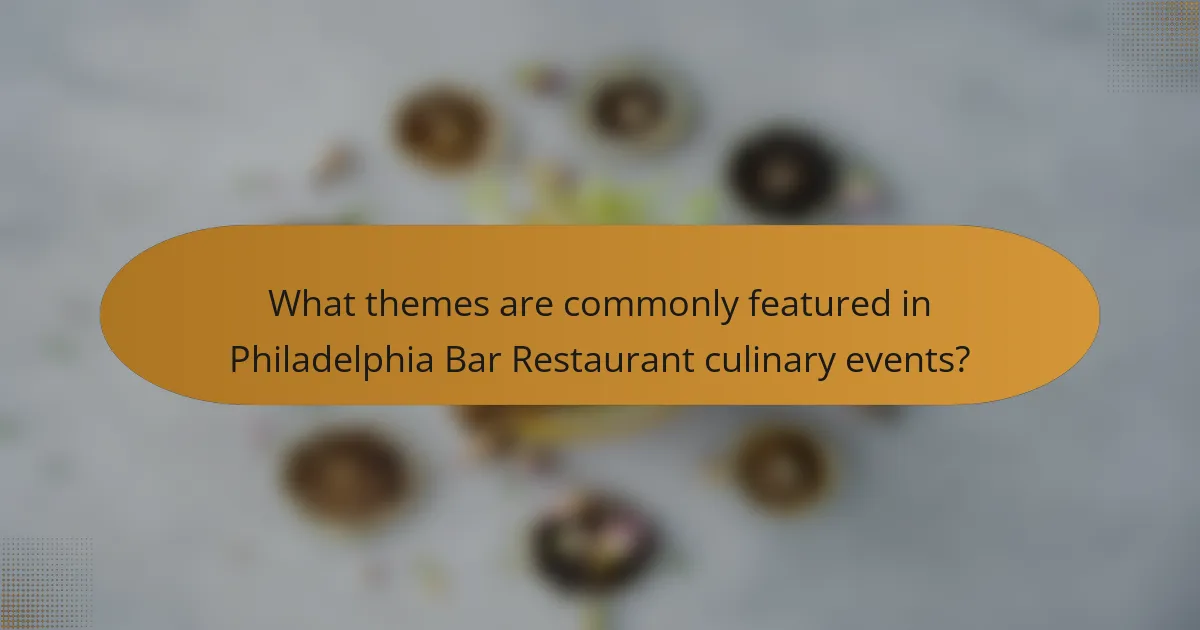
What themes are commonly featured in Philadelphia Bar Restaurant culinary events?
Common themes in Philadelphia Bar Restaurant culinary events include local ingredients, seasonal menus, and cultural cuisine. Events often highlight farm-to-table practices, emphasizing fresh produce from nearby farms. Seasonal menus align with local harvests, showcasing the best of each season. Cultural cuisine themes celebrate diverse culinary traditions, often featuring specific regions or countries. Many events also focus on craft beverages, pairing unique drinks with food offerings. Collaborative dinners with guest chefs are popular, fostering community engagement. Special events often center around holidays or local festivals, creating a festive atmosphere. These themes reflect Philadelphia’s vibrant food scene and commitment to quality.
How do seasonal themes shape culinary events?
Seasonal themes significantly influence culinary events by aligning menus with the availability of fresh ingredients. Restaurants often showcase seasonal produce, which enhances flavor and quality. For instance, summer events may feature vibrant fruits and vegetables, while winter menus often highlight hearty root vegetables and warming spices. This alignment not only reflects the natural growing cycles but also caters to consumer preferences for seasonal dining experiences. Additionally, seasonal themes can create a festive atmosphere, attracting patrons looking for unique culinary experiences that resonate with the time of year. Events may also incorporate local traditions and holidays, further enriching the culinary offerings.
What types of seasonal ingredients are highlighted?
Seasonal ingredients highlighted include fresh vegetables, fruits, and herbs. These ingredients are often sourced locally to enhance flavor and sustainability. Common examples are tomatoes, zucchini, and corn in summer. In autumn, ingredients like pumpkins, apples, and squash become prominent. Seasonal seafood, such as fish and shellfish, is also featured. These ingredients align with the culinary themes of the events. They reflect the local harvest and promote community engagement in Philadelphia’s dining scene.
How do seasonal themes attract diverse audiences?
Seasonal themes attract diverse audiences by creating relatable and timely experiences. These themes resonate with people’s cultural and personal associations with specific seasons. For example, winter holidays evoke nostalgia and celebration, drawing in families and friends. Spring themes often focus on renewal and freshness, appealing to those seeking lighter fare. Seasonal menus can highlight local produce, appealing to food enthusiasts and sustainability advocates. Events centered around seasonal themes can also foster community spirit, inviting participation from various demographics. According to a study by the National Restaurant Association, 70% of consumers are more likely to dine out during seasonal promotions. Therefore, seasonal themes effectively engage a broad audience through relevant and appealing experiences.
What cultural themes are represented in these culinary events?
Culinary events at Philadelphia bar restaurants represent diverse cultural themes. These themes include regional cuisine, which highlights local ingredients and traditional recipes. They also showcase multicultural influences, reflecting the city’s diverse population. Community engagement is another significant theme, fostering connections among attendees and local chefs. Sustainability practices are often emphasized, promoting environmentally friendly cooking methods. Seasonal celebrations are common, aligning culinary offerings with local harvests. Additionally, educational components are present, where chefs share cooking techniques and cultural stories. These themes collectively enrich the culinary landscape and promote cultural appreciation.
How do cultural themes celebrate Philadelphia’s diversity?
Cultural themes celebrate Philadelphia’s diversity through various culinary events. These events highlight the rich tapestry of ethnic flavors and traditions. For instance, festivals like the Philadelphia Chinese Lantern Festival showcase Asian culture. They feature traditional foods, performances, and art. Similarly, the Puerto Rican Day Parade emphasizes Puerto Rican heritage with vibrant cuisine and music. Other events, such as the Italian Market Festival, celebrate Italian-American contributions through food and local vendors. These gatherings foster community engagement and appreciation for different cultures. They also create platforms for local chefs to showcase diverse culinary skills. Overall, cultural themes in Philadelphia’s culinary scene enhance understanding and unity among its diverse population.
What are some examples of successful cultural-themed events?
Some examples of successful cultural-themed events include the Philadelphia Chinese Lantern Festival and the annual Philadelphia Folk Festival. The Philadelphia Chinese Lantern Festival showcases stunning illuminated lanterns and features traditional Chinese performances. It attracts thousands of visitors each year, highlighting cultural appreciation and community engagement. The Philadelphia Folk Festival celebrates diverse musical traditions and promotes local artists. It has been held annually since 1962, drawing large crowds and fostering cultural exchange. These events demonstrate the vibrant cultural landscape in Philadelphia and their ability to unite communities through shared experiences.
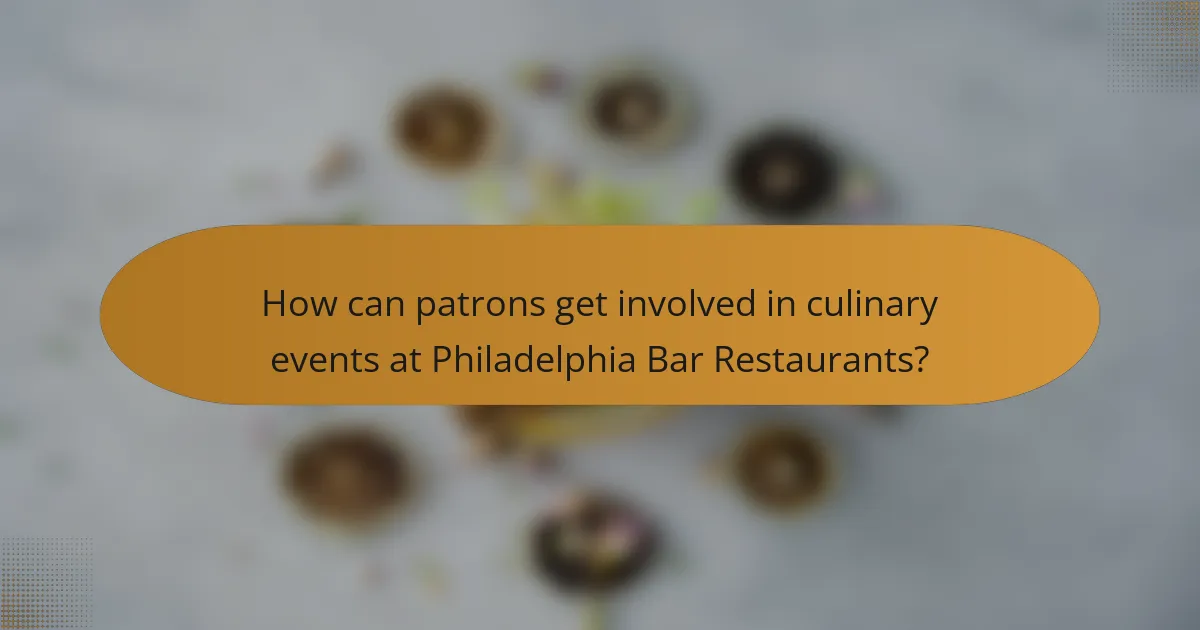
How can patrons get involved in culinary events at Philadelphia Bar Restaurants?
Patrons can get involved in culinary events at Philadelphia Bar Restaurants by participating in themed dinners and tastings. Many restaurants host special events featuring guest chefs or unique culinary themes. Reservations for these events can often be made through the restaurant’s website or by calling directly.
Additionally, patrons can engage by attending cooking classes or food and drink pairings offered by the restaurants. Some establishments may also provide opportunities for patrons to volunteer or assist during events.
Social media platforms are effective for staying updated on upcoming events and promotions. Following the restaurants on social media can provide insights into exclusive culinary experiences.
Lastly, joining loyalty programs or mailing lists can offer patrons early access to event tickets and special promotions.
What are the best ways to stay informed about upcoming events?
Follow local restaurant social media accounts for real-time updates on culinary events. Many Philadelphia bar restaurants announce events on platforms like Instagram and Facebook. Subscribe to newsletters from these establishments for direct information on upcoming themes and guest chefs. Websites like Eventbrite and Meetup list various culinary events in the area. Local food blogs often cover significant events, providing insights and previews. Check community boards and local publications for announcements on food-related gatherings. Engaging with local food communities online can also enhance awareness of events. These methods ensure you remain informed about the vibrant culinary scene in Philadelphia.
What platforms provide updates on culinary events?
Social media platforms provide updates on culinary events. Facebook is widely used for event promotion and community engagement. Instagram showcases culinary events through visual content and stories. Twitter offers real-time updates and interactions about events. Eventbrite allows users to find and register for culinary events. Websites of local restaurants and culinary organizations often post event details. Food blogs also provide insights and updates on upcoming culinary happenings. These platforms collectively enhance awareness and participation in culinary events.
How can patrons participate in or contribute to these events?
Patrons can participate in or contribute to culinary events at Philadelphia bar restaurants by attending the events. They can purchase tickets or make reservations to secure their spots. Engaging with guest chefs during these events allows patrons to ask questions and learn more about the culinary process. Patrons can also provide feedback on the dishes served, which helps shape future events. Additionally, sharing experiences on social media promotes the events and attracts more attendees. Collaborating with local businesses or volunteering for event setup can further enhance their involvement. These actions foster a sense of community and support for the culinary scene in Philadelphia.
What tips can enhance the experience of attending culinary events?
Arrive early to secure the best seating and explore the venue. Engage with chefs and staff to learn about the dishes. Sample a variety of offerings to expand your palate. Participate in any interactive sessions or workshops available. Bring a notepad to jot down favorite dishes and recipes. Connect with fellow attendees to share experiences and recommendations. Follow the event on social media for updates and future events. Stay hydrated and pace yourself to fully enjoy the culinary experience.
How can attendees prepare for a culinary event?
Attendees can prepare for a culinary event by researching the event details and the participating chefs. Understanding the event’s theme helps attendees align their expectations. Reviewing the menu in advance allows for informed choices. Attendees should also consider dietary restrictions and preferences. Bringing appropriate utensils or containers for takeaways can enhance the experience. Arriving early ensures a good spot and maximizes participation in activities. Networking with other attendees can lead to meaningful connections. Lastly, staying hydrated and having a light meal before the event can maintain energy levels.
What etiquette should be observed during these events?
During culinary events at Philadelphia bar restaurants, attendees should observe specific etiquette. First, punctuality is essential; arriving on time shows respect for the hosts and other guests. Guests should also dress appropriately, aligning with the event’s theme or setting. Engaging with chefs and staff politely enhances the experience for everyone involved. It is important to express gratitude for the food and service, as appreciation fosters a positive atmosphere. Additionally, guests should refrain from excessive noise and disruptive behavior to maintain a pleasant environment. Finally, following any specific guidelines provided by the hosts ensures a smooth and enjoyable event for all.
Culinary events at Philadelphia bar restaurants serve as organized gatherings that highlight unique food and beverage experiences, featuring themes such as seasonal ingredients and cultural cuisines. These events often include guest chefs who introduce diverse culinary styles and facilitate cooking demonstrations, enhancing the overall dining experience. Community engagement is a key aspect, fostering connections among attendees and promoting local businesses. The article explores the various themes, the role of guest chefs, and the impact of these events on Philadelphia’s vibrant culinary scene.
